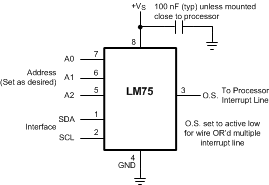SNOS808P January 2000 – December 2014 LM75A
PRODUCTION DATA.
- 1 Features
- 2 Applications
- 3 Description
- 4 Revision History
- 5 Pin Configuration and Functions
- 6 Specifications
- 7 Detailed Description
- 8 Application and Implementation
- 9 Power Supply Recommendations
- 10Layout
- 11Device and Documentation Support
- 12Mechanical, Packaging, and Orderable Information
1 Features
- No External Components Required
- Shutdown Mode to Minimize Power Consumption
- Up to Eight LM75As can be Connected to a Single Bus
- Power up Defaults Permit Stand-Alone Operation as Thermostat
- Key Specifications:
- Supply Voltage
- LM75A: 2.7 V to 5.5 V
- Supply Current
- Operating: 280 μA (Typical)
- Shutdown: 4 μA (Typical)
- Temperature Accuracy
- 25°C to 100°C: ±2°C (Max)
- 55°C to 125°C: ±3°C (Max)
- Supply Voltage
2 Applications
- General System Thermal Management
- Communications Infrastructure
- Electronic Test Equipment
- Environmental Monitoring
3 Description
The LM75A is an industry-standard digital temperature sensor with an integrated sigma-delta analog-to-digital converter (ADC) and I2C interface. The LM75A provides 9-bit digital temperature readings with an accuracy of ±2°C from –25°C to 100°C and ±3°C over –55°C to 125°C.
The LM75A operates with a single supply from 2.7 V to 5.5 V. Communication is accomplished over a
2-wire interface which operates up to 400 kHz. The LM75A has three address pins, allowing up to eight LM75A devices to operate on the same 2-wire bus. The LM75A has a dedicated overtemperature output (O.S.) with programmable limit and hysteresis. This output has programmable fault tolerance, which lets the user to define the number of consecutive error conditions that must occur before O.S. is activated. The wide temperature and supply range and I2C interface make the LM75A ideal for a number of applications including base stations, electronic test equipment, office electronics, personal computers, and any other system in which thermal management is critical to performance. The LM75A is available in an SOIC-8 package and an VSSOP-8 package.
Device Information(1)
| PART NUMBER | PACKAGE | BODY SIZE (NOM) |
|---|---|---|
| LM75A | SOIC (8) | 4.90 mm × 3.91 mm |
| VSSOP (8) | 3.00 mm × 3.00 mm |
- For all available packages, see the orderable addendum at the end of the datasheet.
Typical Application
